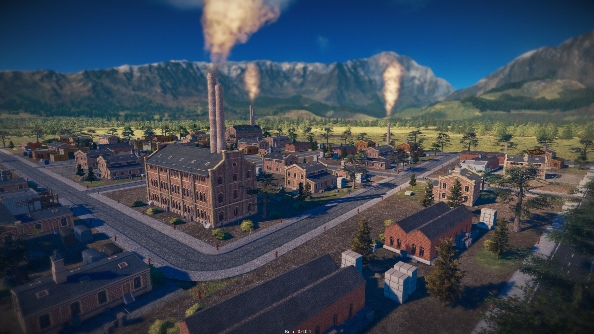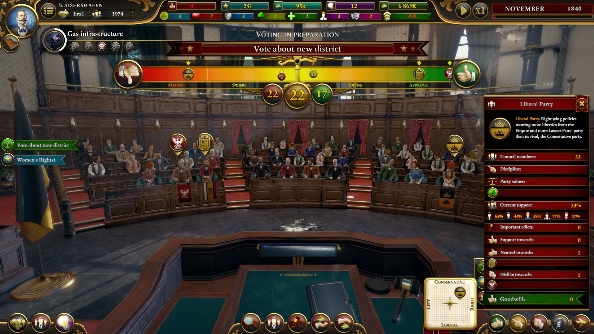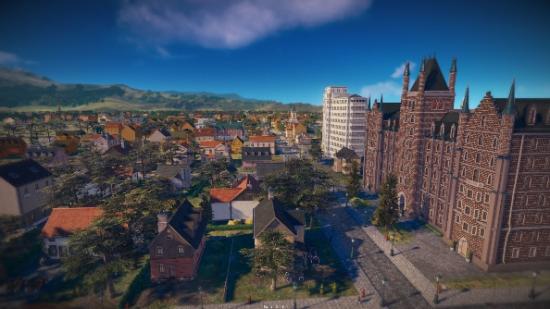Traditionally, city builders have you caught up in the interconnectedness of sewage and drinking water pipes; of road and rail networks; of population and housing. Urban Empires has much of that, but the connections run deeper and wider. Beyond the physical infrastructure of your city, the politics of the region are under your watchful eye, too. It’s down to you to not only keep the lights on and the money flowing, but to keep society content and political parties appeased. No one at developer Reborn Interactive said two centuries of urban development would be easy.
Are you a natural ruler? Then exert your power in some of the finest PC strategy games around.
“Yes, you need to care about how happy the citizens are, but there is a conflict because it’s impossible to make everyone happy,” laughs Jussi Autio, the game’s creative lead. “That’s the reality. But how happy the citizens are has a consequence not only on the political parties, but how well businesses fare.”
With this example, Autio begins to explain how a working class person’s happiness can affect the profits of a company. In Urban Empire each business is assessed by two values: quality and efficiency. While infrastructure, such as ensuring electricity is wired to the company’s buildings, is vital, these two other values can still mean boom or bust. Efficiency comes from working class employees, and the happier they are the more productive the business can be. However, quality is based on the employment of middle-class people and their push for finer things. Again, that requires happiness, but your city politics may often be forced to decide between one group of people and another.
“The interesting thing is that when you play the game, you don’t need to understand all of this, but hopefully when you dig deep you realise how interconnected and important these things are,” says Autio.
So how do you keep the right groups happy? The answer is social justice. “We have seven categories of state laws, such as labour rights,” Autio explains. “The first step would be to allow labour unions to be formed.”
Of course, labour unions won’t impress those looking to oppress their workers, but where would they be without a happy workforce? There are plenty of other state laws to appease various tastes, though: “We have civil rights for who can vote, and women’s rights: can women vote? Then the children’s rights, can parents beat their children freely or not?” lists Autio. Others include laws for minority groups, and legislation for the regulation of business and the environment. It’s important to remember that these laws are not just about allowing things, but also taking rights away; you can be a tyrant should you so wish.

Some of your decisions and attitude to the city will come from the family you represent. Upon starting the game you can select one of several families to suit your intended playstyle. Players wishing to take a hard-right line may want to opt for the heavily conservative von Pfilzens, while lefties may consider other clans. “We have the Kilgannons who are heroes of the underdogs: they’re union activists early on, and human rights activists in the later days. They’re on the side of the unfortunate,” reveals Autio. “Then we have the Sant’Elias, who are the science family and think focusing on the miniscule problems of today is not as important as focusing on science and solving problems of the future.”
These family philosophies are represented in-game by a variety of bonuses, be that an increase in brainpower (the currency of science, typically created by your city’s schools) or the support of certain political parties. But more than that, your family offers a narrative beyond your actions in the city.
“Most of our events are dynamic, meaning the situation in the city launches them, and the outcome is also based on the situation in the city,” says Autio. “But the family narrative is more linear, it’s like a tree branching.” The system is akin to Paradox’s grand strategy titles, with pop-up boxes alerting you to various events triggered by either dynamic events or preset story milestones.

Some of these events may require the passing of legislation, which takes place in a council room screen that strongly echoes the political chamber of Dragon Commander’s airship. Here, political parties and you as the player may suggest motions to introduce new laws, and a meter fills with approval from various supporters. Those aforementioned state laws are a five-step process, but the council room is also home to quick-fire changes in policy. “There are the votes like ‘Shall we build a school?’ Or raise taxes and so on. Then we have the edicts like ‘Should the shops be closed on Sundays?’” explains Autio, revealing the broad nature of the political structure.
There’s a different narrative for each family, so Autio recommends playing each one once as opposed to replaying the same house over and over. However, even if you opt for a hard-right family at the beginning of the game, that doesn’t mean you have to stick to those guns should you realise things are going a little too fascist.
“With the von Pfilzens, conservative parties like you so it’s easier to push through conservative stuff. You’re free to suggest liberal policy, but right-wing parties will still oppose that,” says Autio.
“They’ll be surprised though! ‘Oh how could you suggest that?’” he laughs.
Your two-century-long reign of the city, whether it’s a time of prosperity or downtrodden austerity, starts in 1820. Or January 2017, if you subscribe to publisher Kalypso’s release schedule rather than the in-game timeline.
